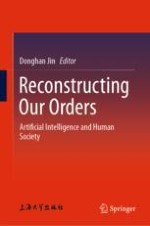
2018 | OriginalPaper | Buchkapitel
1. Artificial Intelligence and People’s Consensus
verfasst von : Shanshan Zhang, Cheng Yang, Nina Qian, Qingye Tang, Xiangfeng Luo, Tuo Leng, Xiaoqiang Li, Yuexing Han
Erschienen in: Reconstructing Our Orders
Verlag: Springer Singapore
Aktivieren Sie unsere intelligente Suche, um passende Fachinhalte oder Patente zu finden.
Wählen Sie Textabschnitte aus um mit Künstlicher Intelligenz passenden Patente zu finden. powered by
Markieren Sie Textabschnitte, um KI-gestützt weitere passende Inhalte zu finden. powered by